Many spiritual philosophies agree that experience is all-important. We could even say the true meaning of life is to experience it, in all its many facets. That we must breathe in the full depth and breadth of it. But when a spirit being is called to this dualistic sphere—to this material plane—we are drawn here because it’s a match for where we are in our development. Our consciousness is limited, so true reality is blurred out to a great extent.
The only way we can experience more of life is if we expand. Doing so requires us to come here, again and again, until all our blocks against life are gone. Then we will have tasted, savored and assimilated all of it. And then we can experience the totality of life, in all its splendor.
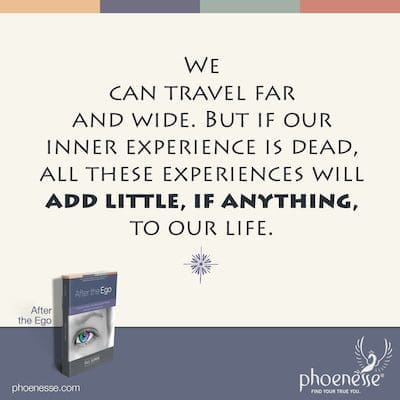
Usually when we hear the word “experience,” we think of an outer experience. This, however, is not really the meaning of the word. The real meaning is inner experience. To wit, we can have outer experiences of all varieties, but if our inner experience is inhibited, the outer won’t mean much.
We can travel far and wide. And we can experience all kinds of situations, experimenting with every “experience” under the sun. We can look at life from every angle, experiencing art, science and nature. We can do all these things, learning everything our brains are able to master. But if our inner experience is dead, all these experiences will add little, if anything, to our life.
Actually, it is possible that such full outer experiences will add to our despair. For it’s very disquieting to not understand the cause of what is happening. A person can have everything they ever wanted, and still, a nagging dissatisfaction remains. They can try to grab for more goodies, or run for more accomplishments, but living a fruitful life becomes ever more elusive. For the inner capacity to fully experience life has not been cultivated. The inner soil has not been prepared. Worse, it has been practically plowed under altogether.
The importance of feelings
For inner experience to be possible, we must be able to feel. If all our feelings have been blocked, then no inner experience can happen. When we deaden our feelings, we deaden all of life. As a result, we can’t feel our lives. And so it is that we must return to the material existence again and again. We must do this until we learn to savor the experience, as best we can, given where we are on our spiritual journey.
To fully savor life, we will need to eliminate the defenses we have built against feeling our feelings. This means we will have to walk through our fear of painful feelings. We’re going to need to accept what we fear, experiencing it as it shows up in this moment. Chances are good, the way we feel right now is the result of feelings from long ago that we never fully experienced. All this time they have been stagnating, and thereby creating a block in our system.
Whenever we fear a feeling, we block the experience. We go numb. Denial and this kind of emotional anesthesia often seem like the only protection we have against feeling awful pain and suffering. And yet, as we do our personal healing work, what we discover is this: What is really causing our suffering is our fight against what we fear.
Regardless what has been inflicted on us from the outside when we were helpless and defenseless, it won’t cripple us if we learn to receive it in the right way—in a healthy way. This, friends, is the only way to rid ourselves of what is undesirable. When we dare to experience—inside ourselves—whatever comes to us, it will no longer be a threat.
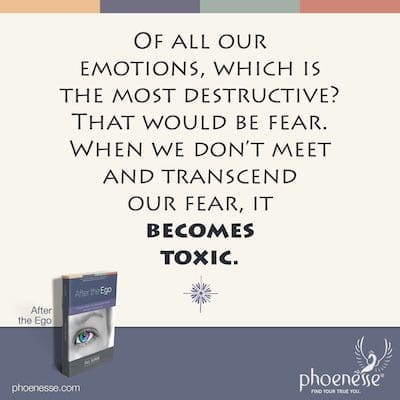
Facing our worst feeling
Now we’ll look more deeply into the significance of our inner emotional experience. In particular, we’ll explore what happens when we block our feelings, and therefore cut off our inner experience.
Of all our emotions, which is the most destructive? That would be fear. When we don’t meet and transcend our fear, it becomes toxic. Fear is a poisonous energy that, when unconscious, will show up indirectly, making it even more debilitating. And the most insidious fear is fear of feelings. These are more destructive than a fear of something outside ourselves. For if we fear a real danger, we can overcome it. In some cases, we’ll exaggerate a fear of some outer occurrence. This wouldn’t be all that harmful. Except such a phobia must be an expression of a feeling we haven’t recognized or felt.
We can deal with anything that is outside us through outer action. Feelings, though, can only be dealt with by experiencing them. And they can’t be experienced when they are denied. When we are afraid of being rejected, not getting our way, or having our pride hurt. Or when we’re frightened of pain or loneliness. In all these cases, our primary feeling is fear.
Only by experiencing what we fear—let’s say, rejection—will we experience the pain of it. So what we are basically dealing with is fear of pain. When we allow ourselves to go into the fear, we can experience the pain. Then the pain will release and go away. And we will have mastered a slice of life we won’t need to avoid any more.
What we usually do is blindly avoid our fear of pain. Eventually we lose track of the fact that we fear a specific pain. We are no longer aware of why we feel numb and dead inside. When we do this, we create a magnetic block of energy in our psyche, which is a powerful force. And this magnetic block is going to draw to us the very experience we wanted to avoid.
Now the pain we were avoiding comes to us from the outside. This will happen time and again, until we can no longer run away from it. This is a spiritual law of life.
If we arrive into the world with such a fear, our life circumstances are going to bring forth the conditions we ran away from in a previous life. In other words, if the circumstances of our early life were hard, filled with pain and deprivation. And if we once again protect ourselves by denying the pain, instead of fully experiencing it. Later in life we will find those circumstances showing up that replicate those earlier conditions.
This will keep happening until we open up to what we fear and allow the experience to be in us. This is the only way to dissolve the associated pain. By fully savoring the painful experience, we truly overcome it. This dissolves the energy of the magnetic block, returning it to the general flow of life inside us. After that, the experience we feared will stop coming to us.
It’s possible we have temporarily avoided the experience we fear by successfully using our inner defenses to so completely shut off life that nothing can touch us. And using our willpower, we may have built an eventful outer life that manages to fill our inner void, at least to some degree. This works, as long as we don’t hold still. This, however, is nothing but a temporary peace before the storm.
Eventually, crisis will come, giving us another chance to overcome our fear. For the more we run, the more energy we invest in blocking off the feared feeling. Then the more potent the magnetic energy block becomes. And the more certainly we will attract a crisis that could be just what we need to heal. If, that is, we choose to change our focus, and pay attention to our inner life.
The value of being vulnerable
If we want to experience pleasure, joy and peace, we must become fearless and relaxed. This is the only way to fulfill our potential and expand our Real Self. If no part of our inner self had anything to cover up—if we had no inner territory we felt we needed to defend and protect—then we would enjoy our full potential for creativity and pleasure. But if we guard against any particle of imperfection—against any one kind of inner experience—then all types of experiences will be equally flattened. This is not hard to see.
If we go through life defended, protecting ourselves against our fear of pain—or really against any undesirable experience—we will tense up. For being guarded is the same as being tense. But pleasure and creativity require a state of relaxation. When we’re holding tight against movement in our inner life, we can’t express ourselves. We’ve separated ourselves from a vital part of ourselves. It’s not a surprise then that we’ve lost touch with ourselves and no longer know who we are and what we’re doing!
We live in a perpetually guarded state, although we don’t consciously think of it this way. So the first step on our spiritual path will be to take a good, hard look at our defenses. Once we’ve done that, we can move on to the next question: What exactly am I guarding against? What we will always find is that we are defending against feeling a pain we have suffered.
We are not able to see, of course, what went on prior to this lifetime. But that’s fine. This lifetime is all we need to see. Whatever pains we experienced early in this life are essentially the same ones we suffered last time. The accumulated energy blocks still reside in our system, attracting the same events over and over. They also make it impossible to meet new experiences cleanly, as though we were a fresh slate. The new difficult feelings are just added to the pool. On the other hand, once we empty this residual reservoir, having fully experienced everything we have accumulated in the past, we’ll flow with new pains in a very different way.
First off, we will stay open and vulnerable through the experience, allow the pain to pass through us softly and gently. We won’t fight the pain and we will fully know why we are in pain. By integrating a painful experience this way, the wave of pain will pass according to its nature—sometimes it will pass quickly, and sometimes it will go more slowly—on its way to dissolving into our inner stream of life.
Because we will be in an open and relaxed state, we will be able to access the inspiration and resources that would otherwise be blocked off. Guidance will come from within, helping us find new actions that will make a difference in our lives and the lives of those around us. We will be filled with a new and continually growing vibrancy when we live like this. What a joy it will be to know that all is well, everywhere.
But when we avoid the painful feelings we fear, and instead try to produce joy through the forceful use of our self-will—joy we can’t have unless we live in an unguarded way—then our will must be smashed by life, again and again. For life—the life force that emanates from our core—cannot be manipulated by our small, fear-filled, controlling mind.
Any time we try to use a forcing current—“I refuse to experience this and I demand to experience that”—in place of the relaxed stream of consciousness, which is soul substance that flows like water, we unavoidably bring crisis onto our heads, creating more pain.
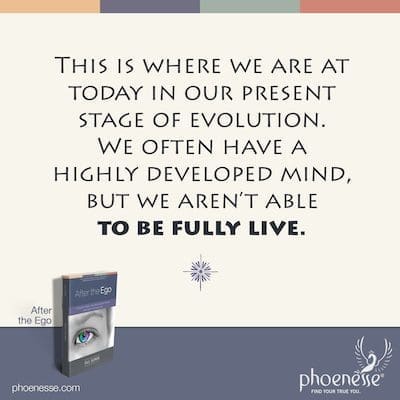
The cause of an identity crisis
The duality we are familiar with as humans comes primarily from fear we haven’t lived through and therefore haven’t dissolved. In effect, we are saying, “I must not experience this.” And that’s what creates duality. Our fear generates both a Yes-current and a No-current and this split current is the whole basis upon which the painful state of duality sits. Such duality thrives in our state of avoiding. In avoidance, we close off to one thing, and that in turn creates an urgent, tense grabbing movement that goes in the opposite direction that stops the flow of life.
What follows from our strong inner denial are rage and violence. Our rage will dissolve when we give up our fear of pain by fully experiencing our old pain. The pain itself will dissolve back into its original nature, which is to be a peaceful, vibrant river of life flowing through our veins. We are each a vital part of this stream.
So our fear of feelings doesn’t only block what wants to flow through us, but it also splits us into a fragmented state. The only way to achieve a higher, more unified state of consciousness is by going through what we fear. Unity can never happen by avoiding fear.
If fear of our feelings causes us to block off our capacity to feel, we will become impoverished—poor in spirit—and this creates the need to come up with a substitution. And what better substitution is there than the limited ego mind. In an effort to not feel how dead and spiritually poor we have become, and in order to feel like we exist, we use our outer mind way more than is natural.
In other words, if we aren’t able to exist through our free-flowing, feeling selves, our will and our intellect will take over, putting themselves exclusively in charge of the part of us with deadened feelings. This will give us the temporary illusion that we are alive. But this aliveness is precarious, and in the long run, it’s not even all that convincing. Because consciousness that lacks feeling lacks spark. Our life, in short, will have no sparkle.
Such an incomplete life will feel sterile and dried out. So then even if we arrive at the most brilliant formulations with our mind—a mind that is not unified with our deeper feeling experience—we will have secret moments when we doubt that we are real. We will doubt our own aliveness.
This is where we are at today in our present stage of evolution. We often have a highly developed mind, but we aren’t able to be fully live. Sometimes we call this condition—being split off from our feeling selves—an identity crisis, which is what happens when we avoid and repress our feelings. We can’t ever know who we truly are when our mind substitutes its so-called “life” for the real thing, which is the greater inner self that can feel.
Mental traps lead to displacement
What happens to our feelings when we deny them? Like, sadness. Where does it go? When we tell ourselves, “I must not be sad. I should not be sad,” we are essentially rebelling against the feeling of sadness. From this, we develop a misconception that being sad is a catastrophe. If we are sad, we will perish. We never fully articulate this—to ourselves, or to anyone else—but nonetheless, it kicks up fear.
What we assume to be true becomes exaggerated, turning the fear into terror. Now we have a terror of being sad, and this creates a compulsive urge to avoid being sad. If the circumstances of our lives force us to feel sad—and they will, as we inevitably attract what we fear—this terror may produce so much inner turmoil that we will, indeed, break down.
It’s quite possible that we have no conscious awareness of how much rebellious anger in us is fueling our terror, or of the misunderstanding we now hold about sadness, causing us to struggle so hard against it. Now when we experience sadness, in our current cut-off emotional state, it doesn’t seem so bad. Now we think we can bear it. But the problem was not that the straight sadness couldn’t be born.
The truth of the matter is this: We can easily bear any clean, straight feeling, no matter what it is or why we have it. What is unbearable—painful, hopeless and frightening—is this inner struggle created by our misconception. When it says in the Bible, “According to thy belief it shall be done unto thee,” this is exactly what’s being talked about. What is not meant is that there will be magic coming from heaven with rewards for the faithful and punishment for those who doubt. It is simply describing the dynamics we’re talking about here.
It’s the overactive mind that comes up with the image, “I will perish if I have to be sad,” even if we’re not conscious we’re thinking this. With the mental concepts we build sustaining the belief that we can’t bear to be sad—and that it is dangerous—we justify our refusing to feel sad. One way we do this is by building cases against anyone who makes us feel sad.
Our mind scrambles to justify why we shouldn’t have to feel this terrible feeling. In this way, we build illusions. And it always seems incredibly hard to let go of our cherished illusions.
Whenever we deny an original experience—like feeling the pain of sadness—this feeling becomes displaced. Then we will experience it elsewhere, in other situations, where it will turn into things like self-pity, depression, hopelessness. These emotions actually are destructive, so indeed, they can take us down. By contrast, the original feeling of sadness—if we had experienced it fully and connected it with what made us sad—would have gone away. It would have run its natural course, assuming we didn’t manipulate it by denying it or exaggerating it.
As one can imagine, it’s extremely important for us to remember this and put it into practice. Otherwise our distortion of a feeling will create part of a vicious circle, and those are always most difficult to get out of. Another aspect of a vicious circle caused by denying sadness is denied anger and rage at life for making us sad.
Anger
Let’s talk about anger. Anger, if we experience it cleanly when someone hurts us or damages us, will resolve itself. Pain is inflicted on us by other people when they deny their inner truth—their real inner feelings—just as much as we inflict pain on other people when we don’t allow ourselves to experience what is. It doesn’t matter if this is what any of us intended to do or not. And we can inflict pain on others by both what we do and what we don’t do.
The climate of omission—of not receiving what we need—in the life of a child is actually more difficult to cope with because nothing actually occurred. There is nothing we can connect our pain to, making it harder to acknowledge and feel, which would eliminate it from our psyche. It’s totally normal and healthy that we initially react to such with anger. But we need to understand that it could be possible to have such a reaction and not act destructively toward other people. Then we can accept our anger without judging or justifying ourselves to anyone.
By allowing ourselves to feel, and by following it through to the pain that caused it, we dissolve it. We become free. If we deny it instead, it turns into hostility and cruelty. This, of course, we’ll need to cover up if we want to conform to the standards of our society. This is how we become further and further alienated from what we truly feel, while distorting the original feeling into something else that’s harder to manage.
Loneliness and Despair
Let’s look at what happens when we deny the original feelings of loneliness and despair, when we say inside ourselves, “I shouldn’t ever have to feel this. I should be spared this experience of feeling despair.” In this case, our denial causes our feeling of despair to turn into bitterness, faithlessness and isolation, which all contain an angst about there being no way out for us.
Were we to experience the original despair head on, without adding layers of mental concepts or conclusions, such a feeling would disappear fairly quickly. By feeling it, without making more of it than there is, we are tuning in to what is really happening in us. This will carry us through the tunnel of darkness and back into the light of life.
To experience momentary despair cleanly does not mean to subtly force a feeling of hopelessness, which is what results from a forcing current. A forcing current is what we use to manipulate life and the people we are now substituting for the ones who caused us the original hurt when we were a child. It says, “I demand you give me everything I ask for. You have to protect me from any and all unpleasant feelings. I will feel hopeless as a way to convince you to do this for me.”
If we are able to decipher and admit to such an irrational message coming from our hidden inner selves, the artificial hopelessness—which is always unbearable—that we’re using to manipulate others will give way to new insight. And this will lead us back to the original feeling we have been avoiding.
If we can make sense of our hidden messages this way, we will take a giant leap forward in self-awareness. We will go through the tunnel of original feelings, and on the other end we will land in the truth and good tidings of spiritual reality: Ultimately, life is safe.
The word “ultimately” does not refer to a faraway beyond. It refers to the ultimate moment when we have the faith and courage to truly explore what’s inside us and feel what’s there to feel. We arrive here whenever we let happen whatever is in us.
We arrive at the ultimate goal when we loosen up the hard, armor plating we have created to defend ourselves against uncomfortable feelings. When we let go of our defenses, we will feel and we will cry. We will tremble and we will writhe. This is how we cleanly and directly feel the original feeling. Then all residual feelings will slip away.
We will then have a new experience every day as the wave of life washes over us. We will no longer live behind an impenetrable wall that nothing can pass through—a wall through which nothing comes in and nothing gets out. Such a state is true isolation of a fearful being that is no longer in unity. Such a person sends a forcing current out into the world saying, “No, I will not feel this!” in a defended stance held up by tight denial.
Fear
Now let’s turn to fear. When we deny fear, it morphs into a vague anxiety that is far more disturbing, for now we have nothing to focus on and so no way to cope with it. But if we face our fear directly, we cascade on to other feelings, including pain, anger, despair and the like. Then there is a way out. So anxiety has displaced fear and, as such, offers no way out.
If we are disturbed or feel vaguely irritated, and can’t put our finger on what happened to us, we shouldn’t just gloss over this. Doing so will only create more fragmented layers and disorientation. Our work is to focus on the sensations we feel, trusting in the fact that there is something tangible for us to find and deal with. We just need to take it out of hiding. This is the path that leads to a more full experience of both present and past feelings.
When we empty the well of old feelings, we will truly live in the present reality, and stop living in the illusion we are reacting to the present, when really we are reacting to a past we keep running to avoid.
Transforming pain into pleasure
Anyone who truly decides to travel into the center of their being can do so at any time. We only need to make the decision to look, feel and experience, and stop projecting onto the outside world what is inside us. In doing so, we can let feelings happen to us, even feelings of disappointment, fear and pain. We can allow them to go to their resolution, transforming them back into the original flow of life. The good news is that when we do this, we will no longer fear our feelings and then those difficult feelings will gradually stop coming to us.
We need to understand that anything undesirable that happens to us comes only because we say No to it. “No, I must not have that experience. What can I do to avoid it?” Many of us start walking a spiritual path such as this, precisely because we’re seeking a better way to avoid undesirable feelings. When it finally dawns on us that the exact opposite is true—that we must turn and go headlong into them—we turn and run away. We are unable, or unwilling, to accept the truth that avoidance is futile. Instead, we insist on our illusion.
It’s of utmost importance then that we ask ourselves: “How afraid am I of a feeling in me? What feeling is it?” In truth, nothing happening outside us can be that frightening by itself. We are only scared of what it will do to us—what it will make us feel. But by going into the feeling we want to avoid, a miracle happens: the acceptance of pain transforms the pain into pleasure. Indeed, this can become a stark reality for us, not some principle we’ve heard about.
The less we block our painful feelings, the more—and more quickly—our pain will turn into pleasure. In this way, we can personally witness the process of unifying a duality.
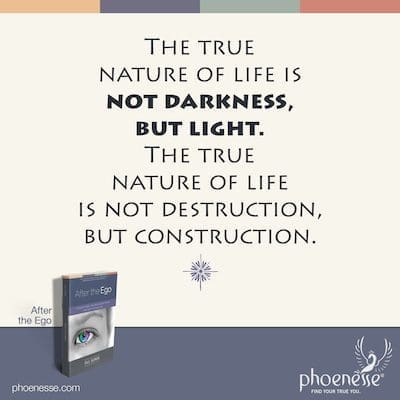
Construction and deconstruction
From here, we can go further on our path of self-transformation by alternating our present feeling with a deep, direct experience of residual feelings. We can learn to stop fighting against any of it, and in that way, we will—for the first time—lose fear. We can start right now. What are the feelings you fear? Really and truly face them. Now try to open up to feeling the feared feeling. Let happen what you thought you couldn’t bear.
None of what we are talking about here is faraway philosophy. All of these concepts can be applied concretely, immediately. We can each verify them for ourselves, if we truly follow through and don’t stop at half-measures. All those who have already done this will attest that what appears, at first, to be a frightening, black abyss turns out to be a tunnel, and on the other end, we come into light. Every single person can experience this. The abyss can never be bottomless, for the true nature of life is not darkness, but light. The true nature of life is not destruction, but construction.
The forces of life that are evil, destructive and demonic are rooted in our fear of experiencing what is in us: our feelings. Based on that fear, we build all our destructive defenses. That’s the only reason destructiveness exists. It sets in because of our fear of feelings—of painful experiences. This causes us to become isolated and arrogant, greedy and cruel, selfish and denying of life.
Our denial makes us untruthful on the most vital level of our being: the inner level. Because if we deny what we feel, we aren’t in truth with ourselves. And that is the definition of evil, if we are willing to use that word. Destructiveness is what lies behind the inner walls we all build against experiencing the truth of what is in us.
We are the ones converting constructive energy into destructive energy. One way we do this is by lying to ourselves when we deny the experience of what we feel, falsifying our Real Self. We become so false that we stop knowing who we really are. In our denial, we create the false hope that we can eliminate any undesirable feeling by avoiding it. Our denial is also responsible for the creation of false hopelessness that the tunnel we must go through is really a bottomless pit of horror and annihilation. This is how we waste the life force available to us, by stemming against the truth. This is how we create our own unnecessary pain.
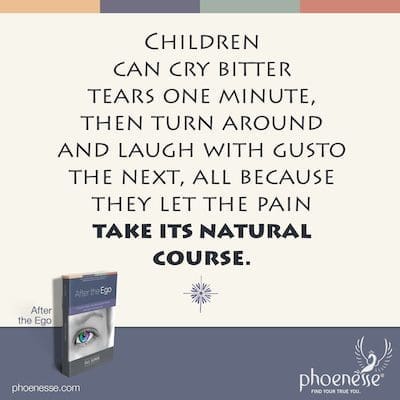
The cleansing process
Our unwillingness to face our original pain leads to the formation of insatiable, greedy demands. We believe these will spare us from all frustration and prevent us from being criticized. We demand to always be loved—and love our way. Until we let go of these unreasonable demands and go through our original pain, we will be caught on the see-saw of submitting and rebelling, which is a very unpleasant vicious circle.
We will submit to the equally insatiable and unreasonable demands of others, joining in a power struggle with them for control. Our goal is to get them to finally do our bidding. We are ashamed of our submission—we hate ourselves for it—and so we rebel, believing we have to prove our “independence”. In either instance, we are violating the interests of our Real Self. In neither case are we aware of what is blindly driving us into submission and rebellion.
To be truly independent, we have to stop making demands. And this will only happen when we are willing to experience whatever comes to us, knowing we are the ones who have produced it, and the place it really exists is inside us.
There are some who purport that children are not capable of reacting any other way to pain than by building defenses that make them go numb. This is only true when, in a previous life, the person did not fully experience residual pain and thereby do away with it. To whatever degree a person has done this—eliminated residual pain—then even in childhood, they will be able to experience severe circumstances in an undefended way.
Such a child will endure the pain and go all the way through it until it ceases on its own, and it will not leave a mark. This is what can happen when pain is fully felt. Feeling pain directly also makes us more resilient, giving us the ability to live a fruitful, productive life. And most definitely, it increases our capacity for experiencing deep feelings of pleasure.
This is the living principle behind “Do not resist evil”. We’d have to be blind to not see that children have a great capacity for this. They can cry bitter tears one minute, then turn around and laugh with gusto the next, all because they let the pain take its natural course. It’s only when we don’t experience the pain that we instead become numb. We become deadened and destructive, and develop any number of neurotic tendencies. So no, we can’t say it’s true that children can’t help but react the way they do—in this self-numbing way—to traumatic situations.
The full experience of feelings is hygiene for the soul. It keeps our spiritual selves from stagnating, when we allow the power within us to fill our whole organism—our spiritual, mental, emotional and physical being. This is the metabolism of our total self.
In the same way physical waste that is not eliminated creates disease in the body, so does unexpelled feeling material cause our souls to become diseased. The healing process that will unify our entire being involves: Committing to feel everything we are able to feel; observing the feelings we fear and the events that evoke those feelings; become willing to at least try to face our fears and experience our feelings.
This is the path to making our lives as full as possible, permeating us with the realization that we are now living our best life, and filling it with deep meaning.
“A lot of love is pouring forth for all of you. May you be able to feel it!”
–The Pathwork Guide
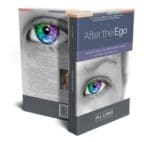
Next Chapter
Return to After the Ego Contents
Read Original Pathwork Lecture #191: Inner and Outer Experience


